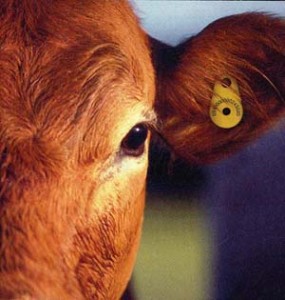
By Dana Gabriel
The National Animal Identification System (NAIS) is a federal program which enjoys the support of large corporate agribusiness farms. It consists of premises registration, as well as animal identification and tracing. It remains voluntary, but some states have taken measures to mandate certain elements of the program. There has been strong opposition from small farmers and ranchers who view NAIS as a threat to privacy and property rights. Full implementation would also be expensive and could put many out of business. NAIS is unfair and by all accounts, would be ineffective. It is yet another way to squeeze out small family farmers and further monopolize America's food production.
NAIS is made up of several different components. In order to receive a premises identification number, information about the location of your animals is required, along with contact information. The next part of the program involves farm animals being tagged with Radio Frequency Identification (RFID) chips. Some are adamantly opposed to any electronic registration and have went so far as to describe NAIS as letting Big Brother into the barn. There is also the cost factor which would place further financial burden on small farmers and ranchers who would be required to tag each individual animal. Some would have no choice but to sell some of their animals, if NAIS becomes mandatory. Others may be forced out of business. Large scale factory farms support NAIS because it would create a livestock database which would be especially beneficial for exporting purposes. In a past article entitled Stop the NAIS, Congressman Ron Paul writes, “NAIS means more government, more regulations, more fees, more federal spending, less privacy, and diminished property rights.”
As a result of growing opposition to NAIS, the United States Department of Agriculture (USDA) has been holding a series of listening and information sessions across the country. This is in an effort to get feedback in the hopes of finding possible solutions that could make the program more viable. The debate should not be on how to best implement NAIS, but rather if it is even needed. Some would like to see a voluntary, privately created, managed and funded program with more transparency. Others believe that it should also be market-driven. In early May, joint House Agriculture and Homeland Security Subcommittees held hearings on NAIS. They centered around the program’s role in protecting U.S. producers and consumers from the effects of an animal disease outbreak.
The USDA describes NAIS as, “a modern, streamlined information system that helps producers and animal health officials respond quickly and effectively to animal disease events in the United States.” Ron Paul has pointed out that, “NAIS is not about preventing mad cow or other diseases. States already have animal identification systems in place and virtually all stockyards issue health certificates. Since most contamination happens after animals have been sold, tracing them back to the farm or ranch that sold them won't help find the sources of disease.” Greater focus needs to be placed on huge industrial farms which tend to be overcrowded and present a greater risk to food safety.
More consumer groups are joining forces with small farmers and ranchers in opposition to NAIS. Some states have also passed anti-NAIS legislation. Arizona was the first to pass a bill outlawing mandatory participation in the program. NAIS does nothing to improve food safety for consumers or prevent animal diseases. At every turn, it favors large scale farming operations and places small farmers and ranchers at a considerable disadvantage.
Trade policies have enabled large agribusinesses to set up monopolies and as a result, a small number of multinational corporations control much of our food production and supply. If NAIS were to be fully implemented and become mandatory, it would threaten the livelihoods of many small farmers. It is costly, intrusive and would further globalize our food system. It is important to become more self-sufficient and support local producers. We must continue to resist NAIS and further challenge this corporate system. Food could be used as a weapon and whosoever controls the food supply, could ultimately control the population.
Dana Gabriel is an activist and independent researcher. He writes about trade, globalization, sovereignty, as well as other issues.
Contact: beyourownleader@hotmail.com